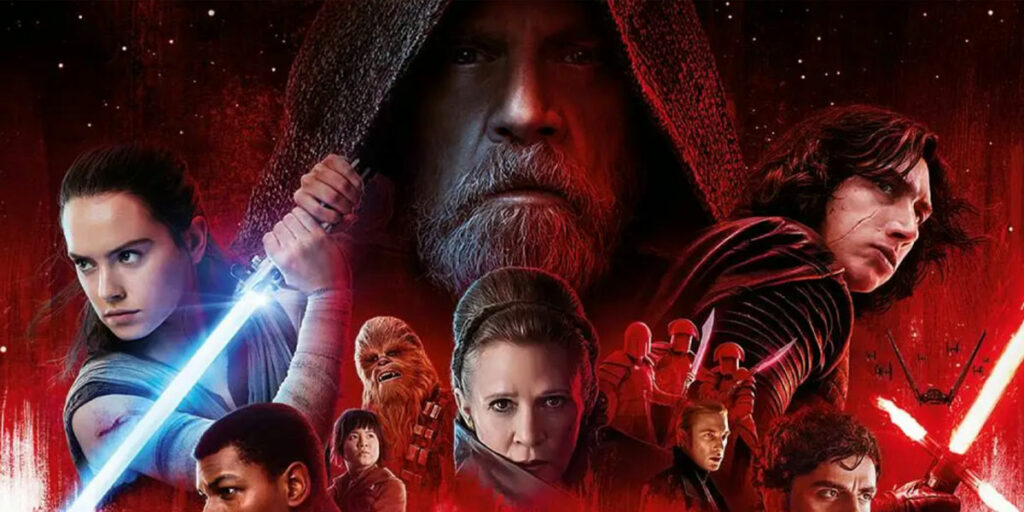Star Wars: The Last Jedi is ridiculed for dismissing the groundwork of The Force Awakens, but it’s a great sequel that continues the story properly. Here’s why.
It really doesn’t feel like five years have passed since the release of Star Wars: The Last Jedi. Not just because the passage of time is a disorienting enigma, but because the public discourse and impact surrounding this movie have been constantly present and exploited ever since it came out. We’re still feeling the aftereffects of The Last Jedi even today, in the perceived fractured state of Star Wars, what movie studios everywhere have tried to learn from it, the genuinely great and healthy debates over the film’s strengths and weaknesses, and the wave of racist and sexist “reviewers” that found a foothold in the online community partially because of the opening The Last Jedi’s fallout created. The Force Awakens wasn’t universally loved either, but the response to that movie was tame in comparison to its sequel. The reactions to The Last Jedi have been intense, beyond divisive, often toxic, and quite frankly exhausting, which is why a part of me is now actually embarrassed to say that I grew up loving Star Wars and am still fond of it, just because it associates me even slightly with the childish mobs that have overshadowed the franchise.
The Force Awakens came out in 2015 and continues the Star Wars story following Return of the Jedi. We’re immediately told that a new regime called the First Order, led by Kylo Ren (Adam Driver) and his master Snoke (Andy Serkis), has risen and is threatening the New Republic and its Resistance forces. We’re introduced to Finn (John Boyega), a Stormtrooper defector, and Rey (Daisy Ridley), a Force-sensitive scavenger with a mysterious past, and we catch up with old favorites like Han Solo (Harrison Ford), Leia (Carrie Fisher), and eventually Luke Skywalker (Mark Hamill). The film was criticized mainly for being too derivative of past Star Wars films, but it was generally well-received and set up a lot of questions that drew most people in.
Its 2017 sequel, The Last Jedi, answered those questions, but many fans did not like what it had to say. We learn of Luke’s mistakes that turned Kylo Ren, his student and nephew, against him and how Luke now considers the Jedi obsolete. Rey realizes that her parents were nobodies who selfishly left her behind, and Kylo Ren kills Snoke to take over the First Order, which largely succeeds in crippling the Resistance and taking control of the galaxy.
To say these developments in The Last Jedi caught people by surprise is an understatement. Many reviewers and fans, even some who like The Last Jedi, believe that the movie was largely dismissive of the plot threads, character arcs, and overall story that were established by J.J. Abrams in The Force Awakens, with writer-director Rian Johnson simply chucking its ideas to the side in favor of his own disparate vision. To a lesser extent, Johnson’s also been criticized for leaving the third film in Disney’s Star Wars Sequel Trilogy with nowhere left to go and a disjointed, incoherent story to wrap up, which many say is a big part of why the third film we did get, The Rise of Skywalker, was a failure as well. When the faults of this new trilogy as a whole are brought up, The Last Jedi is always at the center of the conversation and often perceived to be the point where things went wrong.
I couldn’t disagree more. For my money, The Last Jedi is not only the best film in the Sequel Trilogy by far, but it’s a very natural, very fitting way to continue the story that started with The Force Awakens. It’s the movie that the then-eight-film Star Wars saga seriously needed because of its self-reflective vision, progressive story, and themes of how much of the past you should take with you and how much you should leave behind… all of which started in the previous film and should have cemented this trilogy’s whole tone and narrative purpose. There’s a lot to get through in order to properly explain why I feel that way – I repeat, why I feel that way, not why you have to feel that way – so let’s get right into why The Last Jedi is a great, fitting sequel to The Force Awakens.
THE PHILOSOPHY OF THE FORCE AWAKENS
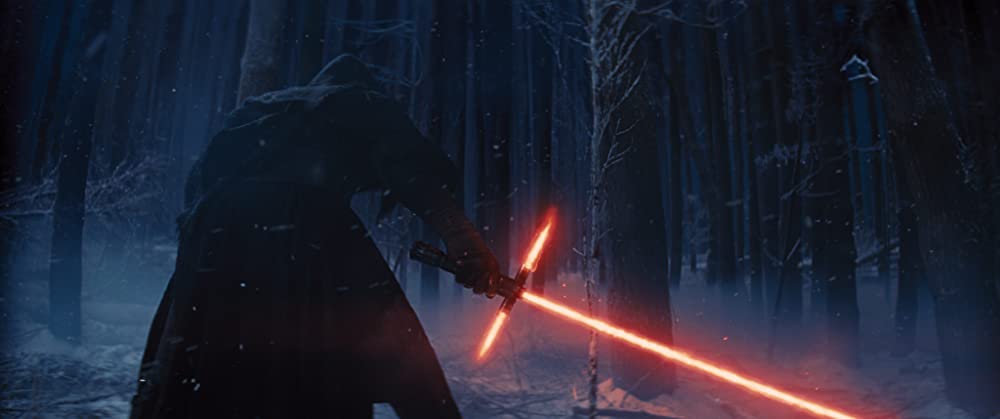
If I’m going to defend The Last Jedi as a sequel to The Force Awakens, it helps to establish how I even interpret the 2015 film. For me, the biggest theme of The Force Awakens can be summed up in one line that’s said to Rey by Maz Kanata (Lupita Nyong’o), an old friend of Han Solo: “The belonging you seek is not behind you, it is ahead.” To Rey specifically, Maz says this when insisting to her that her parents are never coming back and she has to move on. But more broadly speaking, it states that we get better not by dwelling in the past, but by looking to the future, even when it seems like it’s all fallen apart.
This is something that many characters in The Force Awakens struggle to grasp. Tragic history more or less repeated itself after Return of the Jedi, with a Kylo Ren turning to the Dark Side and wiping out the rebuilding Jedi, and Han and Leia cope with the aftermath by, as they themselves put it, going back to the only things they were good at (scavenging as a rogue and commanding armies). Rey is resistant to leaving her home and keeps insisting she’ll return to wait for her family, clinging to it when she’s already lost it (I know, what a Mary Sue). Finn spends so much of the film trying to run away, but he ultimately ends up taking charge and looking out for someone other than himself (that being Rey). Kylo Ren is afraid of not being as strong as his grandfather, trying to live up to the past and struggling to fully embrace his choices. Even the First Order as a whole refuses to move on from their fallen Empire, with the wannabe fascists insisting on bringing their precious establishment back.
When you look at everything that’s set up in The Force Awakens and where its characters, old and new, are emotionally and spiritually, doesn’t it all seem like it’s setting up for a journey of looking to the future? Of characters coming to terms with the fact that dwelling in the past is only going to keep its sins alive and coming back? That’s certainly what I took from it, even in my very first viewing. Were a lot of creative decisions in The Force Awakens fueled by a desire to play it safe after the prequels were ridiculed? Obviously, that’s clear as day. But the film, even if unintentionally (and what Abrams did with The Rise of Skywalker makes me now believe it was unintentional), takes advantage of that by showing the damage that’s done by locking characters and stories in such boxes.
The Force Awakens is also responsible for taking the happy ending of Return of the Jedi and tearing it all apart in one fell swoop. Luke’s efforts to rebuild the Jedi are met with colossal failure and he’s run away into hiding, Han and Leia are separated and unhappy, their own son has joined the Dark Side, and the New Republic (what little we know about it) ends up destroyed … if you’re looking to blame any Star Wars film for going against the idealistic, optimistic vision that you think the other films had, this is where the fingers should be pointed. The Force Awakens is the film that completely derails the path that everyone seemed ready to go down at the end of the original trilogy. The Last Jedi simply delves deeper into all that tragedy and tries to go somewhere with it.
LUKE SKYWALKER IN THE LAST JEDI
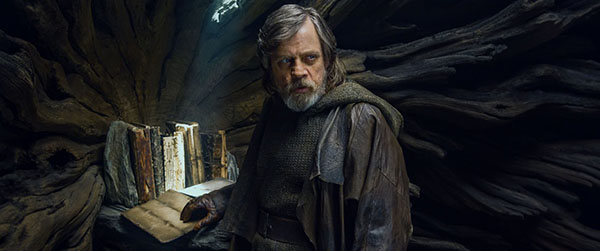
Countless people were caught off-guard and upset by Luke Skywalker’s jaded, bitter characterization… and based on what we’d already learned in The Force Awakens, I still have no idea why. It’s been established that he tried to train new Jedi and one of his students, his own nephew, turned to the Dark Side and destroyed it all. Not only does he then go into hiding, which already makes it clear that something’s off with him, but think about all of this from Luke’s perspective. This is the second time that a member of his family has trained to be a Jedi only to turn evil. But this time, he presumably watched it play out himself and affect those closest to him. At this point, the Jedi ways have brought the Skywalkers nothing but pain and tragedy, on top of all of their flaws as depicted in the prequels.
Before The Force Awakens even ended, I thought it was a pretty obvious assumption that Luke would, at the very least, be a little jaded. How would anyone not second-guess everything they thought they knew after that? The film’s final scene confirmed this, as Luke doesn’t look at all pleased to see Rey show up with his old lightsaber. Even when the teaser for The Last Jedi came out with Luke stating that the Jedi needed to end, that didn’t surprise me at all, and I certainly wasn’t shocked when Luke’s first act in the movie was chucking the lightsaber off a cliff. Even the reveal in The Last Jedi that he very briefly and instinctively thought to kill his own nephew when he saw his growing darkness is similar to when he nearly killed his father thirty years prior after Vader threatened Leia. Only this time, his moment of weakness has drastic consequences, which makes his bitterness even more understandable.
I really, really don’t know what else anyone expected to happen here. If you think this goes against the pure, hopeful image that Luke is widely known for… yes, it absolutely does, and you can dislike that all you want. But The Last Jedi isn’t the film that did that. The Force Awakens is. And when Luke starts discussing all of problems with the old Jedi (which we’d already seen) and the pressure of living up to the perfect, unfailing legend that he’s “supposed” to be (and that fans clearly demand him to be), it’s not a dig at the films of the past or a dismissal of what The Force Awakens set up. It feels like exactly like what needs to be addressed. And if you still think it’s wrong for Luke to be so cynical and to give up on any future for the Jedi or the galaxy, I have great news for you: by the end of the film, that’s no longer who he is. He remembers what made him a hero and legend to begin with, uses that to his advantage, and realizes that the future can learn from and grow beyond past failure. It’s called a character arc, and a lot of people seem to strangely forget that he goes through it when they bring up his portrayal in The Last Jedi.
HOW THE LAST JEDI HANDLES REY’S LINEAGE
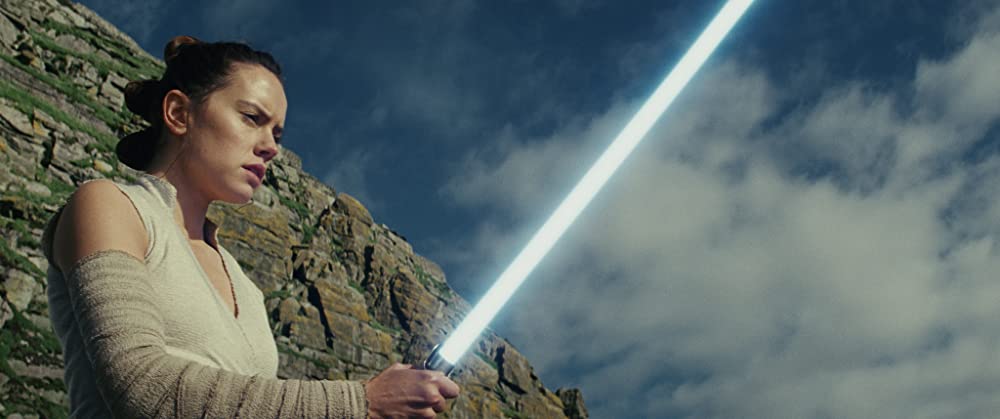
One of the biggest surprises of The Last Jedi at the time was that Rey, whose origins had been heavily theorized by fans for two years, was not in any way related to any important figure in the galaxy. Her parents were stated to be lowly junkies who sold her for drinking money, nothing more. For the sake of my own argument, let’s ignore the retcon in The Rise of Skywalker as much as that movie ignores The Last Jedi. I’ll be the first to admit that I was very sure beforehand that Rey would have an important bloodline… but not really because of anything The Force Awakens itself showed us. Sure, we had one scene where she touches Anakin’s lightsaber and sees flashes of the past, but the vision of Kylo Ren’s rise to power could have easily been the lightsaber’s “memories” and not her own. After all, why would she have a vision of something she didn’t even remember? I think we all assumed that Rey had important relatives not so much because The Force Awakens itself was implying that, but because it’s Star Wars and she’s the new lead of the Sequel Trilogy.
But in hindsight, it feels a lot more like the signs were all there to justify what The Last Jedi does with Rey. They again were probably not intentional by Abrams or co-writer Lawrence Kasdan, but they certainly fit the interpretation that Johnson went for. “The belonging you seek is not behind you, it is ahead,” in particular probably should have clued us in that the identity of Rey’s parents shouldn’t matter. If part of Rey’s overarching journey starting with The Force Awakens is learning to not place all her self-worth in where she came from, wouldn’t it make sense to have where she comes from end up being worthless? Doesn’t that fit a lot more with both movies’ themes of trying to create something better than what came before? Unlike many people’s issues with how Luke was portrayed, I can understand being initially thrown off by this turn. But the second I look at the bigger picture, having Rey come from nothing is much more suitable and poetic than what we all assumed, and it’s very straightforward how it works with what The Force Awakens presents to us.
KYLO REN AND THE REMOVAL OF SNOKE
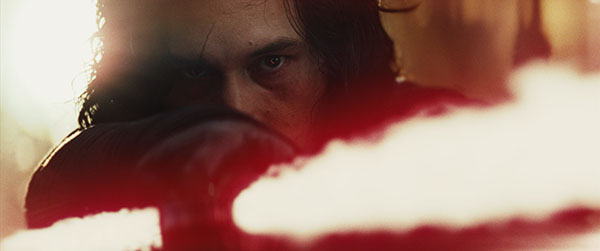
From his first appearance in The Force Awakens, Snoke appeared to be the new main antagonist of the Sequel Trilogy, the final grand foe that would have to be taken down by the end of the three-film story. He’s the obvious Palpatine stand-in as both Kylo Ren’s master and ruler of the First Order. With that also came the universal belief that he would have some connection to at least one past character that would be revealed later on in the trilogy. But much like Rey’s lineage, I think we all brought our own assumptions surrounding Snoke’s role and identity that The Force Awakens itself wasn’t really pushing. In his first film, Snoke still got very little screen time, no discernible motivations for his actions other than just wanting power, and everything that made him interesting was solely based on his relationship with Kylo Ren. I speculated on who he was because I assumed the answer would be big, not because I felt enticed to speculate by the movie itself. While it certainly is made clear that he’s done several terrible things including seduce Ben to the Dark side, his identity never once seemed to be teased or built up as important.
So, when he ends up being dispatched by Kylo Ren – in very satisfying fashion, by the way – I never thought it flew in the face of what had been established. Instead, it’s the best possible way to continue Kylo Ren’s story that had been built up through both movies so far. He tries to live up to a shadow of the past, realizes he can’t, and so gets rid of one of the people holding him back from going his own way. It just so happens that his idealized version of going his own way is still warped and twisted, which makes him perfect as the real main villain for the rest of the trilogy… if only. I also love how Snoke, who’s clearly just vainly trying to capture the kind of glory Palpatine had, is taken out in a way that mirrors Palpatine’s throne room sequences from Return of the Jedi. For him to try to recapture history, only for him to do that too well (dying as Palpatine did), only for Kylo Ren to not follow in his grandfather’s footsteps by then embracing the light, is a great symbolic way for The Last Jedi to break a tired cycle.
THE LAST JEDI’S STANCE ON THE PAST
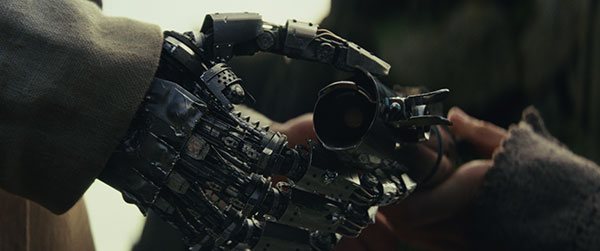
One of the biggest gripes that pops up with The Last Jedi is that it, though it may be bold in how it subverts Star Wars conventions, it takes things too far and outright goes against the franchise’s core philosophies. When Kylo Ren urges Rey to turn away from Luke and the prospects of being a Jedi, he insists, “Let the past die. Kill it if you have to.” That line seems to be what many took away as the main statement the film makes. But if that were true, then The Last Jedi would not have ended with Luke believing in the Jedi again, with the sacred Jedi texts still intact with Rey. The Resistance would not still have its spark left, with that spark spreading throughout the galaxy. The final shot would not be a Force-sensitive kid looking to the stars with hope to achieve greatness (which indicates that the title of the movie, The Last Jedi, is a straight-up lie!). As is the case with most great villains, there is some truth to what Kylo Ren says, but he pushes it to dangerous extremes. He’s right to want to create something new, but he’s wrong for thinking that doing so requires killing everything that’s old. You can’t completely bury the past, nor should you.
Rather, The Last Jedi endorses a happy medium: take the best of what came before with you, and evolve beyond the worst of it. Move on from the past, but don’t forget it. We do excessively worship heroes and put too much stock in the established legends and myths we know, but that doesn’t mean they should be gotten rid of entirely. They still inspire us for good reasons that make them worth holding onto, but they’re also meant for us to learn from. Luke proudly declared himself a Jedi decades prior not because he followed some outdated institutions, but because he stood for the Jedi’s core beliefs: compassion, wisdom, peace. Rey can embody that going forward as well. Because she has the Jedi texts at the end of the movie, she has the starting points of the original Jedi teachings, but they’re now in the hands of new, fresh blood and can be molded and reshaped into something different than before. The line that I think really sums up The Last Jedi’s message is when Yoda (Frank Oz) briefly shows up and brings Luke to his senses by stating, “We [masters] are what they grow beyond.” All of this confirms what I had believed this trilogy to be about since The Force Awakens: trying to build a better future.
In fact, dare I say it, I still think The Last Jedi plays things too safe, primarily with its world-building. Granted, the movie immediately has an uphill battle with how shabbily The Force Awakens established where the galaxy is and what brought it to that point. The main characters’ storylines are good to go, but the context and everything happening around them are so bare-bones that The Last Jedi was going to have to play catch-up no matter what. But still, I’m confused by how much isn’t included or fleshed out beyond the central story. Why not go into more detail about or even show Luke’s Jedi academy before it fell? Why not elaborate on how and why Ben Solo was already heading down a dark path even before his incident with Luke? Why not get more explicit with the failures of the New Republic and how they let the First Order happen? For a film both lauded and hated for how bold it is, there are several areas where I don’t see much more boldness than The Force Awakens. This isn’t as revolutionary or game-changing a Star Wars film as so many people make it out to be.
THE LAST JEDI LEFT BEHIND PLENTY TO WORK WITH
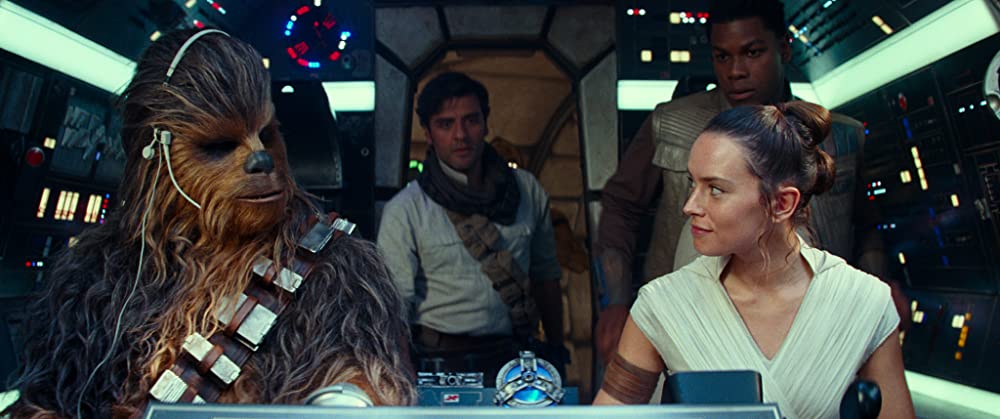
Not only has The Last Jedi been widely ridiculed for supposedly dismissing what came before, but it’s also been criticized for leaving its successor with nothing to work with. Some have said that J.J. Abrams was in a tricky spot in making The Rise of Skywalker because he made the first film in the Sequel Trilogy, then someone else came in and “undid” most of what he’d set up, and then he had to come back in to do one more movie when almost all of his loose ends were already tied up. After all, by the end of The Last Jedi, Rey’s parents have been revealed, she and Kylo Ren have seemingly committed to their paths, Luke gives his life to save the Resistance, and Snoke is out of the picture. So, what else is there to do that could fill up one final film?
Well, how about the fact that the Resistance has still yet to actually defeat the now-dominant First Order? You know, the main villainous faction of the new trilogy? With their spark now being relit, wouldn’t it make sense that we would then see them building themselves back up and forming a plan to take the First Order down for good? The same applies to how the Force is seen to be spreading throughout the galaxy like with the Canto Bight kid? Shouldn’t the next film then show the beginnings of a new wave of Jedis-to-be? Kylo Ren’s now running the First Order, so why not see how he handles that, especially with his still-unresolved feud with his second-in-command Hux (Domhnall Gleeson)? And on the side, since we never did learn exactly how Snoke lured Ben Solo to his side, maybe the final installment could briefly fill us in via flashbacks or something?
Really, what more do you possibly need to make a satisfying final film? I’m really not reaching to come up with these ideas. These are all things that so obviously were meant to be continued for Episode IX, and I’m kind of baffled every time I hear someone say there was nothing left for this trilogy to do after The Last Jedi. Why did Snoke need a replacement in Palpatine instead of Kylo Ren just being in charge as the main villain? Why did Rey’s origins need to be instantly retconned instead of exploring the impact her lackluster origins has on her and others? Why did we need the entire first act of The Rise of Skywalker to be a fetch quest that just sets up what Abrams clearly wanted to do instead of just rolling with the rich potential that was already given to him? Even Colin Trevorrow’s leaked script for Episode IX before he left the project managed to work with what it had fine enough, at least in that unfinished state. The Rise of Skywalker isn’t a failure because it was in a no-win scenario caused by The Last Jedi. It’s a failure because it doesn’t recognize what its predecessors were doing and how many great story threads were still left on the table.
ANSWERING QUESTIONS VS. REWRITING ANSWERS
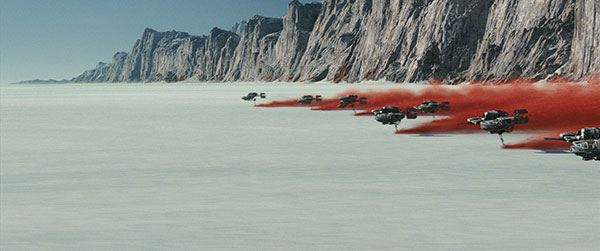
If you dislike Luke being bitter, your childhood heroes being dead or unhappy, Rey being a nobody who’s naturally talented, and a lack of proper world-building context, those are all fair enough reasons to dislike The Last Jedi. But it’s not the film that initiated all of that within this trilogy. It either directly went along with what The Force Awakens established or interpreted story beats that were left vague enough to not have any “right” or “wrong” way to be continued. Rian Johnson didn’t go against any plans, because not only does his narrative work with what came before it, but there was no plan to begin with. The Force Awakens provided us with a lot of unanswered questions, and The Last Jedi answered those questions. Everyone’s obviously free to like or dislike those answers, but that doesn’t mean the film just chucks its predecessor’s ideas aside. Unlike its follow-up, which does outright change what had already been established and breaks the storytelling as a result. The Last Jedi answers questions, while The Rise of Skywalker rewrites the answers.
The Last Jedi and The Force Awakens are now available to watch on Disney Plus, on digital, and on demand. Read our ranking of all Star Wars movies.

